2. SUPPLY SPECIFICATIONS | |
| (Revision Date: Apr. 24, 2008) |
| 2.5 SPECIFICATION OF RFID TAG (for |
|
|
3)
When RFID supplies are to be rolled, roll hardness must be concerned.
Although it depends on the type of glue, tag, and backing paper,
4) Sensor
When the transmissive sensor or reflective sensor is enabled, transmissivity or reflectivity of a label or tag may vary at an
5) Cutter
When an RFID label or tag is used in cut issue mode, care must be taken not to cut the antenna or the IC chip of an RFID tag in order not to damage the cutter.
6) Static Electricity
When printing is performed in a place where humidity is low or under some specific conditions, writing data on an RFID tag may fail due to static electricity generated by a label or a ribbon.
